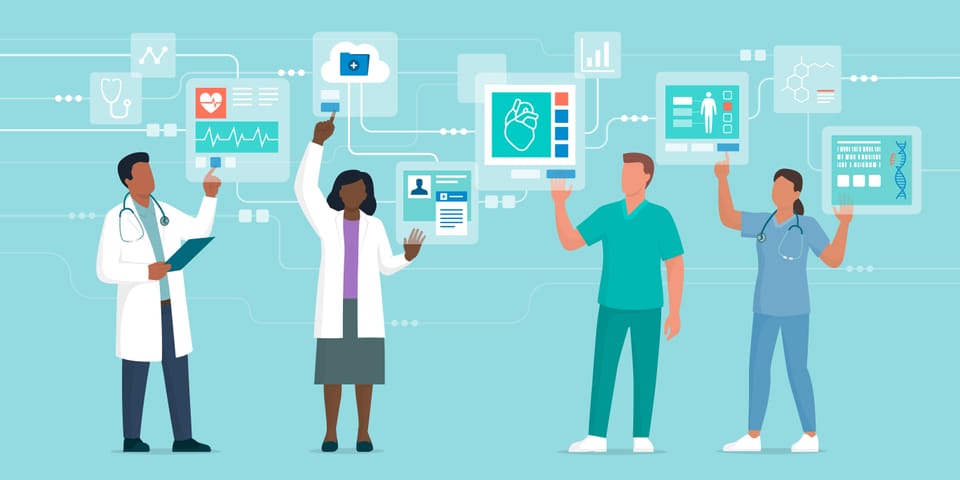Securing Patient Trust: The Role Of Healthcare IT Specialists In Data Protection
Table of Content
The healthcare industry handles a massive amount of personal and private information about patients. We're talking medical records, insurance details, and more – a goldmine for bad guys looking to steal and misuse this sensitive data. That's why healthcare IT professionals play a super important role in protecting patient trust by putting strong security measures in place.
Let's explore why their work matters so much and the strategies they use to keep our info locked down tight.
Just How Serious Are Patient Data Breaches?
Before getting into the solutions, you need to understand just how devastating data breaches can be in healthcare. A single breach can expose the private details of thousands, even millions of people. We're talking about identity theft, financial fraud, and issues getting proper medical care down the line. The fallout can be downright disastrous, not just for those affected patients but for the healthcare organization's reputation and finances, too.
Picture this - your entire medical history with all your diagnoses, treatments, personal details - in the wrong hands. Just the thought probably makes you feel uneasy. This is why healthcare tech support from Resultant or other agencies are the unsung heroes, working their tails off to stop these nightmares from happening.

The Multi-Layered Approach to Data Security
Keeping patient data under lock and key involves a multi-pronged approach. Healthcare IT specialists utilize a variety of strategies to create an impenetrable forcefield of protection. One key area is access control. They enforce strong authentication methods like complex passwords or biometrics so only authorized staff can access sensitive files. Strict policies determine who can access what based on their job roles and responsibilities. And they regularly monitor user activity to catch any suspicious behavior that could indicate a breach.
Another crucial layer is data encryption. Healthcare IT staff encrypt data, whether it's stored on devices or servers or transmitted over networks. They use top-notch, industry-standard encryption methods and protocols. And they regularly update those encryption keys and methods to stay one step ahead of emerging threats that could crack current protection.
Network security is another big priority. Firewalls, intrusion detection systems, and secure virtual private networks help control network access. Segmenting networks into smaller pieces limits the areas hackers can roam if they breach the outer walls. The 24/7 monitoring of network traffic helps spot any anomalies or red flags of infiltration quickly.
Backups and data recovery prepare for the worst-case scenario of a breach. Chicago based IT services implement robust backup solutions to ensure data can be recovered after an attack or system failure. But they frequently test those backups to validate they actually work as intended. Backup data gets stored securely, separately from the main systems, to avoid corruption.
Last but not least is continuous employee training and awareness. Healthcare IT conducts regular security training for all staff. They teach them how to spot potential threats like phishing attempts or suspicious activities. And they stress the critical importance of following all security protocols and best practices to the letter.
Staying One Step Ahead
In the fast-paced cybersecurity world, healthcare IT specialists have to stay frosty and adaptable. They're constantly researching new vulnerabilities, tactics used by bad actors, and emerging threats. This allows them to proactively update and shore up weak spots before they can be exploited.
Just as importantly, they obsessively keep the software, operating systems, and security tools updated and patched with the latest fixes. They also make it a priority to join communities, attend conferences, and learn from the top experts. That way, they can stay one step ahead of the ever-evolving threat landscape.
Teamwork Makes the Dream Work
Protecting patient medical records isn't a one-person job. Healthcare IT specialists work hand-in-hand with various other parties to create cohesive, comprehensive security. One key partnership is with doctors, nurses, and administrative staff on the front lines of patient care.
IT experts collaborate closely to understand their unique security needs and workflow requirements. This allows them to design and implement customized solutions that provide both security and seamless usability.
Another vital partnership is with government bodies and regulators that enforce data privacy laws like HIPAA. By ensuring compliance with these rules and regulations, healthcare IT builds a solid foundation of security that meets the highest standards.
Finally, healthcare organizations frequently leverage the expertise of third-party security vendors and consultants. These specialized partners can offer services, tools, and seasoned professionals to bolster and enhance an organization's cybersecurity posture.
The Usability Balance
As crucial as security is, healthcare IT pros also have to make sure solutions are user-friendly. At the end of the day, doctors and nurses need fast, uninhibited access to health records to properly diagnose, treat, and care for people. It's a tricky tightrope to walk between lockdown security and frontline usability.
These IT experts work closely with end-users to deeply understand their unique workflows and access needs. From there, they can design and implement security protocols and tools that are both ultra-secure yet still smooth and easy to navigate day-to-day without creating unnecessary blockers.
Things like single sign-on solutions and streamlined authentication methods reduce the headache of juggling multiple complex passwords. And consistent training with clear instructions ensures clinical staff understand the importance of following all security protocols without disrupting their ability to work effectively.
The Future of Healthcare Data Security
As technologies and threats keep rapidly evolving, so do the challenges and opportunities in data security. Healthcare IT professionals are at the forefront, embracing cutting-edge solutions to bolster protection against ever-more sophisticated attacks.
For example, artificial intelligence and machine learning technologies can automatically detect and respond to potential threats in real-time without human intervention. This reduces the risk of human error while quickly neutralizing emerging risks.
Blockchain is another fascinating emerging technology being explored for secure, decentralized storage of patient data. The distributed, encrypted nature of blockchain could enhance data integrity, transparency, and auditability in healthcare recordkeeping.
The rise of the Internet of Things also presents new challenges as more connected medical devices like wearables hit the market. Healthcare IT must implement secure protocols and access controls to protect against this explosive growth of new vulnerabilities.
Finally, cloud computing brings incredible capabilities and new security considerations. As healthcare professionals and organizations increasingly leverage the cloud, IT staff must ensure rigid data encryption and access controls and take advantage of advanced cloud security capabilities.
The Bottom Line
In healthcare, data security is both a technical necessity and a moral obligation. Patients entrust us with their most personal information, and protecting that trust is paramount. Healthcare IT professionals spearhead this crucial effort through their security expertise, vigilance against threats, collaboration, and innovative use of new technologies.
Their dedication ensures patient data remains secure, upholding the integrity of the healthcare industry.










